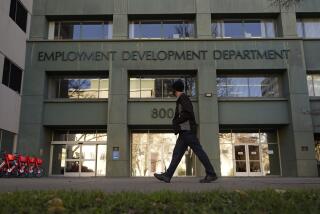House OKs extending jobless pay
- Share via
WASHINGTON AND LOS ANGELES — The House voted overwhelmingly Tuesday night to approve a $1.4-billion stopgap extension of jobless benefits, but some states are beginning to seek longer-term solutions to an unemployment problem that is expected to worsen heading into next year.
The extension, covering an additional 13 weeks, would maintain payments for more than 1 million workers in 29 hard-hit states whose benefits are set to expire before the end of 2009. Unemployment payments for more than 300,000 U.S. workers will end this month alone.
The measure would extend immediate help to the 66,000 unemployed Californians whose benefits are expected to run out by the end of September and the 170,000 who will exhaust benefits by the end of the year, said Loree Levy, a spokeswoman for the California Employment Development Department. In all, more than half a million unemployed Californians could benefit from the extension.
Along with previous extensions, the measure would boost the normal 26 weeks of jobless benefits in California to a maximum of 92 weeks. About 1.5 million Californians currently are receiving unemployment checks, Levy said.
The Senate is expected to approve the extension quickly, and it would take effect as soon as it is signed into law. It would be paid for by deferring a scheduled reduction in unemployment insurance tax paid by employers.
But with the nation’s jobless rate, currently at 9.7%, projected to climb to double digits well into 2010, researchers say that as many as 2.5 million jobless workers will exhaust benefits by next summer, sharply increasing the cost of further extensions.
In California, whose unemployment rate hit 12.2% in August, officials are projecting that the unemployment insurance fund will be more than $17 billion in the red by the end of 2010. It’s one of 21 states whose unemployment insurance funds are insolvent.
“States throughout the country are finding they did not collect enough money to cover a recession this long and this deep,” said Philip J. Romero, dean of the College of Business and Economics at Cal State L.A.
Responding to the longer-term challenge, New Jersey last week announced it would pay businesses up to $2,400 for every idle worker they hire whose government unemployment benefits have expired.
Officials in other states, along with experts in unemployment insurance policy, are looking at such options as using tax credits for job creation and allocating existing federal funds to create temporary jobs.
“I think we need to be creative, so everything should be on the table,” said Andrew Stettner, deputy director of the National Employment Law Project, a research and advocacy group.
The U.S., unlike many developed countries, has traditionally seen unemployment insurance as a short-term device to cushion workers against the normal ups and downs of the economy. But the worst recession in more than half a century has forced a reconsideration of that approach.
The official number of unemployed in the U.S. has doubled to 15 million, and a record one-third of those workers have been jobless for six months or longer. Employment development offices across the country are overwhelmed.
“Most states are processing unemployment insurance claims on outdated computer systems originally developed in the 1970s to handle a fraction of the state’s current claim loads,” said Tom Whitaker, president of the National Assn. of State Workforce Agencies, at a congressional hearing last week.
His organization estimates that the number of people applying for unemployment insurance benefits has tripled over the last year.
Across the country, unemployment benefits range from $40 to $450 a week, although the stimulus package added $25 a week for the remainder of 2009.
Soon “you’re going to be rolling into Christmas season. . . . It will have a huge impact,” said Rep. Jim McDermott (D-Wash.), who introduced the legislation approved Tuesday by a 331-83 vote.
But it’s unclear how much longer Washington can keep the safety net in place for the long-term jobless, especially given the concerns about the nation’s soaring budget deficit.
Gary Burtless, a senior fellow at the Brookings Institution, says the extension of benefits is urgently needed and will also pump up consumer spending, a crucial component of the economy.
“But what about people who exhaust benefits after Jan. 1?” he asked, saying it raises issues of “fairness and evenhandedness.”
Among other ideas, Burtless has suggested that the government consider creating public-service jobs to help long-term jobless workers, but he said there appeared to be little support for such a plan.
Timothy Bartik, a senior economist at the W.E. Upjohn Institute for Employment Research, has advocated a tax credit to businesses that create jobs. The plan is similar to a government subsidy used in the 1970s but has garnered little support from Congress.
Severe budget crunches in some of the largest states with high unemployment would make innovation difficult. With strained budgets and overworked staffs, maintaining the status quo is a challenge in itself.
Although the extended benefits would certainly be welcomed by states, it would add a crush of more applications for thinly staffed departments that already are stretched to the limit.
In California, where the unemployment claim load is double that of the next highest state, the Employment Development Department has added Saturday hours as well as computers in the lobbies to speed up and handle the bulging volume of applicants.
“The demand is just unprecedented,” department spokeswoman Levy said.
Employment Development Department representatives answered 363,000 calls in August, more than double the 108,000 calls answered in January. The department processed 198,000 online inquiries in August, up from the 79,000 it received in January.
The state, which pays out $77 million a day in total unemployment insurance benefits, has hired 1,669 people this year to help process claims and added an extra hour to call-center opening hours during the week.
But some residents still are finding it challenging to deal with the agency.
Reuben Quesada lost his teaching job in June but was denied unemployment benefits.
The 53-year-old Menifee resident filed an appeal but was told his case wouldn’t be resolved until December.
“How am I going to survive until then when . . . there are no jobs to be found?” he said.
--
alana.semuels@latimes.com
More to Read
Get the L.A. Times Politics newsletter
Deeply reported insights into legislation, politics and policy from Sacramento, Washington and beyond. In your inbox twice per week.
You may occasionally receive promotional content from the Los Angeles Times.












